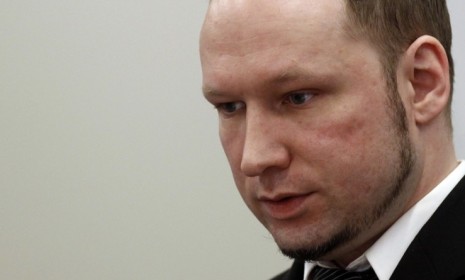Norway's Anders Behring Breivik prosecution: A model for U.S. terror trials?
The anti-Muslim extremist is using the courtroom as a soapbox, but he might actually be discrediting his cause and making a case for trying terrorists in civilian court

A free daily email with the biggest news stories of the day – and the best features from TheWeek.com
You are now subscribed
Your newsletter sign-up was successful
Anders Behring Breivik, Norway's confessed mass killer, appears to be making good on his plan to turn his trial into a "circus" to showcase his extremist, anti-Muslim views. Breivik admits to killing 77 people last July, but says he did it to defend his country against multiculturalism, likening the young Labour Party members he gunned down to the Hitler Youth. Norway's prosecution stands in stark contrast to the U.S. policy of barring high-profile terrorism suspects from civilian courtrooms altogether. Is the Breivik case an example of how not to handle high-profile terror cases? Or does Breivik's ranting make a case for trying terrorists in civilian court in order to discredit their views?
Norway is showing the U.S. how it's done: The Breivik trial could serve as a model for the U.S. as it prosecutes al Qaeda suspects, says James Joyner at Outside the Beltway. "A sober, fair trial in an American court for a Muslim accused of heinous crimes would send a powerful message that the United States really believes in the 'rule of law' that it preaches abroad and is in fact not engaged in a war against Islam." Hardcore Islamists won't be swayed, but "those on the margins" just might.
"Anders Breivik and Khalid Sheikh Mohammed"
The Week
Escape your echo chamber. Get the facts behind the news, plus analysis from multiple perspectives.

Sign up for The Week's Free Newsletters
From our morning news briefing to a weekly Good News Newsletter, get the best of The Week delivered directly to your inbox.
From our morning news briefing to a weekly Good News Newsletter, get the best of The Week delivered directly to your inbox.
It's wrong to give a terror suspect a microphone: "The court is not to be used as a soapbox from which the defendant spouts political views," says Paul Mendelle at Britain's Guardian. Breivik is entitled to a defense in court, but that doesn't mean he has some inalienable right to use the witness stand to express his "twisted" ideology. "What is being proffered by Breivik does not appear in any legal sense to amount to self-defense."
"Why Anders Breivik's trial seems strange to the eyes of an English lawyer"
Breivik's ranting only discredits his cause: In his trial this week, Breivik called his attack "the most spectacular sophisticated political act in Europe since the Second World War," says Max Fisher at The Atlantic. "It's not hard to imagine Khalid Sheikh Mohammed saying something similar about Sept. 11." Yet Breivik's boasting isn't "sparking a far-right-extremist renaissance." If anything, "the popular backlash" is putting the anti-immigrant far-right on the defensive, which seems to be an argument for the Norwegian model, and against the U.S.'s Guantanamo alternative.
"What America can learn from Norway's Anders Breivik trial"
A free daily email with the biggest news stories of the day – and the best features from TheWeek.com
-
 Antonia Romeo and Whitehall’s women problem
Antonia Romeo and Whitehall’s women problemThe Explainer Before her appointment as cabinet secretary, commentators said hostile briefings and vetting concerns were evidence of ‘sexist, misogynistic culture’ in No. 10
-
 Local elections 2026: where are they and who is expected to win?
Local elections 2026: where are they and who is expected to win?The Explainer Labour is braced for heavy losses and U-turn on postponing some council elections hasn’t helped the party’s prospects
-
 6 of the world’s most accessible destinations
6 of the world’s most accessible destinationsThe Week Recommends Experience all of Berlin, Singapore and Sydney